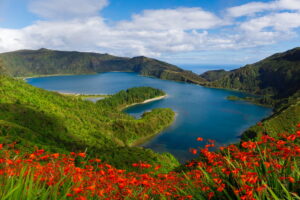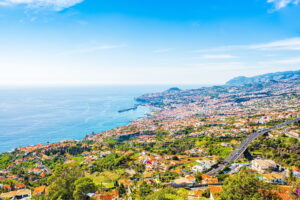For Cypriots considering island destinations beyond the Mediterranean, Portugal’s Atlantic archipelagos offer compelling alternatives with unique characteristics. The Azores and Madeira present distinct island experiences that both complement and contrast with Cyprus’s Mediterranean charm. This comprehensive comparison will help Cypriot travelers understand what makes these Portuguese islands special and how they compare to home.
Geographic and Climate Overview
Location and Accessibility
Azores Archipelago:

- Location: 1,500km west of mainland Portugal in the Atlantic
- Composition: Nine volcanic islands across three groups
- Main islands: São Miguel, Terceira, Faial, Pico, São Jorge
- Flight time from Cyprus: 8-12 hours with connections
Madeira Archipelago:

- Location: 1,000km southwest of mainland Portugal
- Composition: Four islands (Madeira, Porto Santo, Desertas, Selvagens)
- Main island: Madeira, with smaller inhabited Porto Santo
- Flight time from Cyprus: 7-10 hours with connections
Cyprus for Reference:
- Location: Eastern Mediterranean, 75km south of Turkey
- Size: 9,251 km² (third-largest Mediterranean island)
- Climate: Mediterranean with hot, dry summers
Climate Comparison Analysis
Azores Climate:
- Type: Oceanic subtropical
- Temperature range: 14-25°C year-round
- Rainfall: High (1,200mm annually)
- Humidity: Consistently high (70-80%)
- Weather pattern: Changeable, “four seasons in one day”
Madeira Climate:
- Type: Subtropical Mediterranean-influenced
- Temperature range: 16-26°C year-round
- Rainfall: Moderate north, dry south (600-1,200mm)
- Humidity: Moderate (60-70%)
- Weather pattern: Stable, with microclimates
Cyprus Climate:
- Type: Mediterranean
- Temperature range: 10-35°C (seasonal variation)
- Rainfall: Low (400-600mm annually)
- Humidity: Variable (40-70%)
- Weather pattern: Predictable seasons, hot dry summers
Seasonal Weather Patterns
Best Visiting Times from Cyprus:
Spring (March-May):
- Azores: Mild temperatures, frequent rain, blooming landscapes
- Madeira: Perfect weather, comfortable temperatures, fewer crowds
- Cyprus advantage: Cypriots escape peak heat season
Summer (June-August):
- Azores: Warmest period, still cooler than Cyprus, occasional rain
- Madeira: Warm and dry, similar to Cyprus but more comfortable
- Cyprus comparison: Both Portuguese islands offer cooler alternatives
Autumn (September-November):
- Azores: Pleasant temperatures, increased rainfall, harvest season
- Madeira: Excellent weather continues, wine harvest period
- Cyprus benefit: Extended travel season beyond Mediterranean heat
Winter (December-February):
- Azores: Coolest temperatures, frequent storms, dramatic landscapes
- Madeira: Mild and sunny, perfect escape from European winter
- Cyprus advantage: Year-round travel options unavailable at home
Cultural and Historical Comparisons
Island Heritage and Identity
Azorean Culture:
- Settlement: Portuguese colonization from 15th century
- Cultural mix: Portuguese, Flemish, and Moorish influences
- Language: Portuguese with unique Azorean dialect
- Religion: Predominantly Catholic with strong traditions
- Economy: Agriculture, fishing, tourism, dairy farming
Madeiran Culture:
- Settlement: Portuguese discovery and settlement (1419)
- Cultural influences: Portuguese, British, and Northern European
- Language: Portuguese with Madeiran accent
- Religion: Catholic with British Protestant minorities
- Economy: Tourism, wine, agriculture, crafts
Cypriot Culture (for context):
- Heritage: Greek, Turkish, British, and Byzantine influences
- Languages: Greek, Turkish, English
- Religion: Orthodox Christian majority, Muslim minority
- Economy: Services, tourism, finance, agriculture
Architectural Styles
Azores Architecture:
- Distinctive features: Black basalt stone, white lime mortar
- Church architecture: Baroque influences with volcanic stone
- Traditional houses: Low-built for wind protection
- Unique elements: Colorful window frames, geometric gardens
Madeira Architecture:
- Colonial influences: Portuguese colonial with British elements
- Distinctive features: Red tile roofs, white walls, wooden balconies
- Quintas: Traditional manor houses with gardens
- Churches: Manueline and Baroque styles
Cyprus Architecture:
- Influences: Byzantine, Venetian, Ottoman, British colonial
- Materials: Local limestone, wood, clay tiles
- Traditional houses: Courtyard designs, flat roofs
Natural Landscapes and Geology
Volcanic Origins vs Mediterranean Formation
Azores Geological Features:
- Formation: Active volcanic archipelago
- Unique landscapes: Crater lakes, hot springs, fumaroles
- Notable sites: Sete Cidades lagoon, Furnas thermal valley
- Activities: Geothermal bathing, volcano hiking, cave exploration
- Natural phenomena: Active seismic activity, thermal springs
Madeira Geological Features:
- Formation: Volcanic origin, now dormant
- Landscapes: Dramatic cliffs, levada channels, laurel forests
- Unique features: UNESCO World Heritage laurisilva forest
- Activities: Levada walking, mountain hiking, canyoning
- Natural highlights: Pico Ruivo peak, Cabo Girão cliffs
Cyprus Geological Context:
- Formation: Mediterranean tectonic activity
- Landscapes: Mountains, coastal plains, rolling hills
- Unique features: Troodos ophiolite complex
- Activities: Mountain hiking, coastal walks, archaeological sites
Biodiversity and Natural Heritage
Azores Biodiversity:
- Endemic species: 70+ endemic plant species
- Marine life: Whale and dolphin watching opportunities
- Protected areas: Multiple nature reserves and Geoparks
- Unique ecosystems: Laurel forests, crater lake environments
Madeira Biodiversity:
- Endemic flora: 150+ endemic plant species
- UNESCO recognition: Laurisilva forest World Heritage site
- Marine protected areas: Rich Atlantic marine life
- Bird life: Endemic species and migratory stopover point
Cyprus Biodiversity:
- Endemic species: 140+ endemic plants
- Unique habitats: Salt lakes, pine forests, coastal ecosystems
- Protected areas: Akamas Peninsula, Troodos National Forest Park
Tourism Infrastructure and Activities
Adventure Tourism Comparison
Azores Adventure Activities:
- Water sports: Surfing, diving, whale watching, sailing
- Land activities: Hiking, canyoning, spelunking, horseback riding
- Unique experiences: Thermal bathing, volcano tours, tea plantation visits
- Skill levels: Options for beginners to advanced adventurers
Madeira Adventure Activities:
- Signature activities: Levada walking, mountain hiking, canyoning
- Water activities: Diving, whale watching, deep-sea fishing
- Unique experiences: Cable car rides, toboggan runs, botanical gardens
- Accessibility: Well-developed infrastructure for all levels
Cyprus Adventure Activities:
- Water sports: Windsurfing, kitesurfing, diving, sailing
- Land activities: Hiking, cycling, rock climbing
- Cultural activities: Archaeological site visits, wine tours
- Beach activities: Extensive coastline with varied beach types
Accommodation and Infrastructure
Azores Tourism Infrastructure:
- Accommodation: Quintas, guesthouses, boutique hotels
- Transportation: Car rental essential, limited public transport
- Dining: Traditional Azorean cuisine, fresh seafood
- Tourist services: Developing eco-tourism focus
Madeira Tourism Infrastructure:
- Accommodation: Full range from luxury resorts to rural tourism
- Transportation: Good bus network, cable cars, rental cars
- Dining: Portuguese cuisine with international options
- Tourist services: Well-established, multilingual support
Cyprus Tourism Infrastructure:
- Accommodation: Comprehensive from budget to luxury
- Transportation: Extensive bus network, rental cars widely available
- Dining: Cypriot, Greek, international cuisines
- Tourist services: Mature tourism industry, English widely spoken
Cost Analysis for Cypriot Travelers
Budget Breakdown Comparison
Daily Budget Estimates:
Azores:
- Budget travel: €50-70 per day
- Mid-range: €90-130 per day
- Luxury: €200-300 per day
- Key costs: Higher food prices due to island imports
Madeira:
- Budget travel: €60-80 per day
- Mid-range: €100-150 per day
- Luxury: €250-400 per day
- Key costs: More expensive than mainland Portugal, but competitive
Cyprus (for reference):
- Budget travel: €40-60 per day
- Mid-range: €80-120 per day
- Luxury: €200-350 per day
Value Proposition Analysis
Azores Value Factors:
- Pros: Unique geothermal experiences, pristine nature, authentic culture
- Cons: Higher costs for basic necessities, weather unpredictability
- Best value: Eco-tourism, adventure activities, authentic experiences
Madeira Value Factors:
- Pros: Year-round pleasant climate, excellent infrastructure, diverse activities
- Cons: More touristy than Azores, higher accommodation costs
- Best value: Hiking activities, botanical experiences, wine tourism
Transportation and Accessibility
Inter-island Transportation
Azores Inter-island Travel:
- Flights: SATA Air Açores connects all islands
- Ferries: Seasonal service between central group islands
- Duration: Flights 30-90 minutes, ferries 2-8 hours
- Cost: Flights €80-200, ferries €20-50
Madeira Group:
- Internal flights: Limited, mainly to Porto Santo
- Ferries: Regular service to Porto Santo (2.5 hours)
- Cost: Ferry €25-35, flights €100-150
Cyprus Internal Travel:
- No inter-island travel (single main island)
- Internal transportation: Buses, taxis, rental cars
- Maximum travel time: 3 hours across the island
Getting There from Cyprus
Flight Routes to Azores:
- Connections: Usually via Lisbon or other European hubs
- Airlines: TAP Air Portugal, Azores Airlines, European carriers
- Total travel time: 8-12 hours including connections
- Seasonal variations: More direct options in summer
Flight Routes to Madeira:
- Connections: Via Lisbon, London, Frankfurt, or direct charters
- Airlines: TAP, easyJet, British Airways, Lufthansa
- Total travel time: 7-10 hours including connections
- Direct options: Occasional seasonal direct flights
Culinary Experiences
Traditional Cuisine Comparison
Azorean Cuisine:
- Signature dishes: Cozido das Furnas (geothermally cooked stew)
- Specialties: Fresh seafood, island cheeses, pineapples
- Unique products: São Jorge cheese, Azorean tea
- Cooking methods: Geothermal cooking, traditional wood ovens
Madeiran Cuisine:
- Signature dishes: Espetada (beef skewers), black scabbard fish
- Specialties: Madeira wine, poncha cocktail, honey cake (bolo de mel)
- Unique ingredients: Passion fruit, local herbs, Atlantic fish
- Influences: Portuguese with international touches
Cypriot Cuisine (for context):
- Signature dishes: Souvlaki, moussaka, kleftiko
- Specialties: Halloumi cheese, Commandaria wine, loukoumades
- Influences: Greek, Turkish, Middle Eastern
- Cooking methods: Grilling, slow cooking, traditional ovens
Wine and Beverage Culture
Azorean Wine:
- Unique features: Volcanic soil viticulture
- Notable wines: Biscoitos DOC, Graciosa wines
- Production: Small-scale, family-owned vineyards
- Tasting experiences: Vineyard visits, traditional quintas
Madeira Wine:
- World-renowned: Fortified wine with 500+ year history
- Varieties: Sercial, Verdelho, Bual, Malmsey
- Production methods: Unique estufagem heating process
- Tourism: Extensive wine cellars and tasting tours
Cyprus Wine:
- Ancient tradition: 4,000+ year winemaking history
- Notable wines: Commandaria (world’s oldest named wine)
- Grape varieties: Indigenous Xynisteri and Maratheftiko
- Wine routes: Established wine tourism infrastructure
Best Island Choice for Different Cypriot Travelers
Adventure Seekers
Choose Azores if you want:
- Unique geothermal experiences unavailable anywhere else
- Pristine nature with minimal tourist development
- Whale watching and marine adventures
- Authentic Portuguese island culture
- Variable weather that adds to adventure
Choose Madeira if you want:
- Reliable weather for outdoor activities
- Well-developed hiking infrastructure (levadas)
- Mountain adventures with excellent facilities
- Combination of nature and comfort
- More predictable travel conditions
Cultural Enthusiasts
Azores Cultural Advantages:
- More authentic, less commercialized experience
- Unique religious festivals and traditions
- Traditional agriculture and crafts still practiced
- Strong community connections
- Living museum of Portuguese island culture
Madeira Cultural Advantages:
- Rich historical architecture and museums
- International cultural influences
- Sophisticated cultural events and festivals
- Historical quintas and gardens
- Maritime heritage and exploration history
Relaxation Seekers
Azores for Relaxation:
- Natural thermal springs and spa experiences
- Peaceful, uncrowded beaches
- Slower pace of life
- Connection with pristine nature
- Authentic local experiences
Madeira for Relaxation:
- Luxury resort facilities
- Consistent pleasant weather
- Beautiful botanical gardens
- Sophisticated dining and entertainment
- Well-developed wellness tourism
Practical Considerations for Cypriots
Language and Communication
Portuguese Language Tips:
- Similar to Spanish: Cypriots familiar with Spanish will find some similarities
- English availability: Better in Madeira than Azores
- Learning resources: Portuguese courses available in Cyprus
- Cultural bridge: Latin heritage creates some familiarity
Currency and Costs
Financial Considerations:
- Currency: Euro (same as Cyprus)
- Banking: EU banking agreements apply
- Cost level: Generally higher than Cyprus due to island isolation
- Budgeting: Plan 20-30% more than equivalent Cyprus experiences
Health and Safety
Medical Considerations:
- Healthcare: Portuguese national health system
- EHIC validity: European Health Insurance Card accepted
- Emergency services: Standard EU emergency number (112)
- Specific concerns: Atlantic ocean safety, volcanic activity awareness (Azores)
Seasonal Planning Guide
Spring Travel (March-May)
Azores in Spring:
- Weather: Cool and wet, but beautiful for photography
- Activities: Whale watching season begins, hiking in comfortable temperatures
- Crowds: Very low tourist numbers
- Prices: Lowest accommodation rates
Madeira in Spring:
- Weather: Perfect temperatures, minimal rainfall
- Activities: Ideal hiking weather, flower festivals
- Crowds: Moderate, pleasant atmosphere
- Prices: Good value before summer peak
Summer Travel (June-August)
Azores in Summer:
- Weather: Warmest period, but still variable
- Activities: Peak season for all outdoor activities
- Crowds: Highest tourist numbers but still manageable
- Prices: Peak season rates apply
Madeira in Summer:
- Weather: Warm and dry, perfect beach weather
- Activities: All activities available, busy period
- Crowds: High season, book accommodations early
- Prices: Highest rates, especially coastal areas
Autumn Travel (September-November)
Azores in Autumn:
- Weather: Pleasant temperatures, increasing rainfall
- Activities: Harvest season, excellent hiking
- Crowds: Fewer tourists, more authentic experiences
- Prices: Good value, shoulder season rates
Madeira in Autumn:
- Weather: Still excellent, perfect for outdoor activities
- Activities: Wine harvest season, ideal hiking conditions
- Crowds: Fewer than summer, but still active
- Prices: Better value than summer peak
Winter Travel (December-February)
Azores in Winter:
- Weather: Coolest temperatures, frequent storms
- Activities: Limited outdoor activities, cultural focus
- Crowds: Very low, authentic local experience
- Prices: Lowest rates, some facilities may be closed
Madeira in Winter:
- Weather: Mild and pleasant, Europe’s winter refuge
- Activities: Hiking, cultural activities, perfect escape weather
- Crowds: Popular with Northern Europeans, moderate levels
- Prices: Good value outside Christmas/New Year period

Both the Azores and Madeira offer Cypriot travelers unique Atlantic island experiences that complement rather than compete with Cyprus’s Mediterranean charms. The choice between them depends on your priorities: the Azores for authentic, adventure-filled experiences in pristine natural settings, or Madeira for reliable weather, excellent infrastructure, and sophisticated tourism offerings.
For Cypriots accustomed to predictable Mediterranean weather and well-developed tourism infrastructure, Madeira provides a more familiar framework with exciting new experiences. The Azores appeal to those seeking authentic adventure and unique geothermal phenomena unavailable anywhere else in Europe.
Both destinations offer excellent value for Cypriot travelers seeking to expand their island experiences beyond the Mediterranean, providing new perspectives on island life, culture, and natural beauty. Consider visiting both on separate trips to fully appreciate their distinct characters and offerings.
Read More:
Sources:
